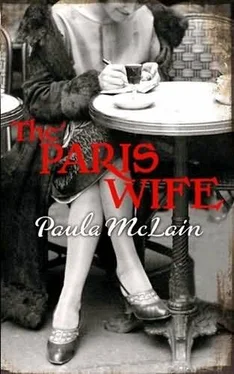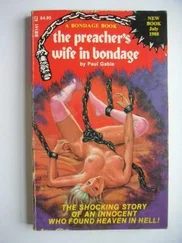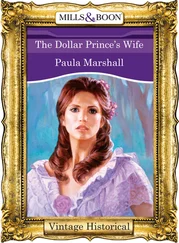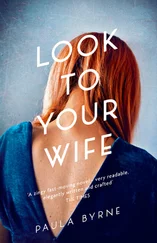“Papa,” he said. It had been his first word, and he loved to say it as often as possible. Ernest liked this, too.
“Papa has written an awfully good book,” Ernest said, smiling up at Bumby, who was growing pinker by the moment.
“Give Papa a kiss,” I said, and Bumby, who was now down in Ernest’s arms squirming happily, slathered his papa’s face.
It was such a fine moment, the three of us perfectly aligned, gazing at the same bright star, but later that night, when I was lying in bed trying desperately to sleep, my worries circled around again and wouldn’t let me rest. I’d been edited out of the book from page one, word one. Why didn’t Ernest seem concerned that I’d be hurt or made jealous? Did he assume I understood the story needed a compelling heroine, and that wasn’t me? He certainly didn’t follow me around with a notebook, jotting down every clever thing I said the way he did with Duff. Art was art, but what did Ernest tell himself? I needed to know.
“Tatie,” I said in the dark, half hoping he was sound asleep. “Was I ever in the book?”
Several seconds passed in silence and then, ever so quietly, he said, “No, Tatie. I’m sorry if that hurts you.”
“Can you tell me why?”
“Not exactly. The ideas come to me, not the other way around. But I think it might be that you were never down in the muck. You weren’t really there in the story, if that makes sense, but above it somehow, better and finer than the rest of us.”
“That’s not how it felt to me, but it’s a nice thought. I want to believe it.”
“Then do.” He turned over on his side, his open eyes searching for mine. “I love you, Tatie. You’re what’s best about me.”
I sighed into his words, feeling only the smallest sting of doubt. “I love you, too.”
Over the coming weeks, Ernest continued to work on the novel, tightening the language, scratching whole scenes out. It was all he thought about, and because he was so distracted, I was very happy to have friends around to keep me company. In the end, he didn’t seem to mind Pauline, and I was grateful for that.
“She chatters on about Chanel too much,” he admitted, “but she’s smart about books. She knows what she likes, and more than that, she knows why . That’s very rare, particularly these days, when everyone’s more and more full of hot air. You never know who to trust.”
With Ernest’s endorsement, Pauline began coming by the sawmill in the afternoons to keep me company. We’d have tea while Bumby played or napped, and sometimes she went with me to the music shop when I practiced at my borrowed piano.
“You really do play beautifully,” she said one day when I’d finished. “Especially the Busoni. I thought I was going to cry. Why is it you never played, really?”
“I couldn’t break through. I just wasn’t good enough.”
“You could still. You should.”
“You’re very dear, but it’s not true.” I stretched my fingers and then closed my music book. “This is my life now, anyway. I wouldn’t want another.”
“No, I wouldn’t either if I were you,” she said, but later, when we were walking home from the shop, the scheme was still on her mind. “You might not have to give anything up to take music more seriously,” she said. “A concert wouldn’t have to be terribly traumatic. Everyone loves you. They want to see you succeed.”
“It would take so much more time and effort,” I said. “And I’d need my own piano.”
“You should have your own anyway. Surely Hem knows that. I can talk to him if you’d like.”
“We’ll see,” I said. “I’ll give it some thought.”
The rush of anxiety about performing in front of others never diminished much, but more and more I began to wonder if a concert might be good for me after all-particularly now, when Ernest was so absorbed by his novel. The book blotted out every other thought and crept in even when we were making love. I could feel him there one moment, with me, inside me, but then gone the next, simply vanished into the world he was making.
My playing wouldn’t change anything about his habits-I wasn’t naïve enough to think that-but I thought it might give me my own focus and outlet, beyond the details of Bumby’s feeding schedule and exercise regimen. I loved being his mother, but that didn’t mean I couldn’t have other interests. Stella managed it beautifully. In fact, she was the new model of a wife, and I was the outdated, provincial variety.
It was ironic to think that nearly all of the women I knew now were direct benefactors of the suffragette work my mother did decades ago, right in our own parlor, while I curled up with a book and tried to be invisible. It was possible that I was never going to catch up with the truly modern woman, but did I have to hide my head so willfully? Couldn’t I experiment just a little to see what else might feel right, especially when I had good friends who loved me, as Pauline had pointed out, and wanted me to succeed?
In time, Pauline introduced us to many of her finer, Right Bank crowd, like Gerald and Sara Murphy. Gerald was a painter, but more than this, he was an icon of good taste and the good life. He and Sara had come to Paris in 1921, and though they had a beautiful apartment on the Quai des Grands-Augustins, they were gradually migrating to the South of France, where they were building an estate on the Riviera, at Antibes. Gerald had studied architecture and the estate, Villa America, would be the Murphys’ joint opus, the most beautiful thing they could imagine and afford-and they could afford a great deal. Pauline also introduced us to the poet Archibald MacLeish and his lovely wife, Ada, who sang well, professionally even, and wore the most beautifully beaded dresses I’d ever seen.
I was surprised at how tolerant Ernest seemed of these new acquaintances. In private he snidely called them “the rich,” but he couldn’t help but respond to the attention he got from them just the same. In Our Time came out in the States in early October, and not long after, copies could be found at bookshops all over town. The reviews were all tremendously positive, calling Ernest the young writer to watch. His prospects seemed brighter and brighter, but these new friends weren’t simply hangers-on. They wouldn’t be content warming their hands at the edge of Ernest’s success; they wanted to fan the fire.
In the meantime, Pauline began coming to the sawmill for dinner several nights a week, and sometimes Ernest would meet her in one or other of the cafés. I was so relieved that the relationship felt natural and mutual. I’d never liked fighting with Ernest about Kitty, but he wouldn’t budge. She was and would always be “that gold-plated bitch” to him, but Pauline brought out his kinder, more fraternal side. He began to call her Pfife, and so did I. To Bumby, she was Tante Pfife and she had nicknames for us, too. Ernest was Papa or Drum, and I was Hash or Dulla. Together we were her adorables, her cherishables.
As fall turned to winter, and the Paris damp seeped in through the windows and under the doors, Ernest made a decision to put the Pamplona novel away.
“I can’t see it at all anymore. I don’t know what’s good or where I’m failing. It has to simmer on its own awhile.” He sighed and scratched his mustache, which had gotten thick and unruly lately, handsomely uncivilized. “I’ve been thinking about starting something wholly different. Something funny.”
“Funny seems to suit Don and Harold, but I’m not sure it’s the thing for you.”
“The first thing you ever saw of mine was funny. You’re saying that wasn’t any good?”
“Not at all. Only that your work has more of a spark when it’s dramatic.”
Читать дальше












